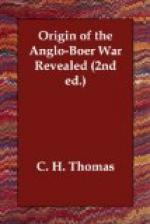In connection with the stated inadequacy of spare land it is well to note that, of the two Republics, the Transvaal only possesses undeveloped Government reserve land. This is all situated in more or less low-lying and fever-stricken parts, large tracts being absolutely uninhabitable for that reason, especially in summer. Some of the rest is occupied on terms of lease by burghers, and has up to the present afforded scope for some of the less aspiring class. About one-quarter of the aggregate Transvaal farms are owned by Uitlander individuals or by companies who are mostly English. But the bulk of the land owned by burghers in both States has gradually become cut up by the process of succession into holdings so small as to admit of hardly any further division. There are, of course, numerous exceptions of wealthy farmers who can still bequeath to each of their sons a whole farm of 6,000 acres, or half a farm. In the face of these restrictive circumstances a scheme has been in preparation during the past years, promoted by the Bond coterie in Holland and the Governments of the two Republics, to effect a large emigration from Holland to those States. A company has thus been formed, called “Nederlandsche Emigratie Maatschappy voor Transvaal en Oranje Vry Staat.” The prospectus describes the objects as agricultural, pastoral, and industrial, but, as “members,” only such are invited as are disposed to join hands with the Boer cause. That scheme came into operation before the outbreak of the war. What else does it reveal but a thinly veiled recruiting device for auxiliaries against England?
Education
What has been said about the ignorance and illiteracy of the Boers may be admitted to apply to the great majority of the grown-up and of the more maturely aged population; those of youthful age have of late years had the benefit of a better education than had before been possible to provide. But the great drawback consists in the still very imperfect knowledge of High Dutch, and it will take many years yet before a more general proficiency in that language will qualify the youth for more than purely elementary studies. There are numerous exceptions, however, of very creditably educated Boers, whose parents have been able to get them taught at Colonial schools, such as the Stellenbosch seminary, and even in Holland. Besides this, there are the children and grandchildren of the many educated Hollanders who have continued to stream into the Republics since 1854, and who had the advantage of learning High Dutch from their parents. Those, as a rule, bestowed great attention to their children’s education, and in many cases sent them to Holland to complete their studies. The greatest factor of the educated Dutch element in South Africa consists of the mass of Hollanders itself, who have made their way to the Republics, and especially to the Transvaal, during the past eighteen years, among whom are many




